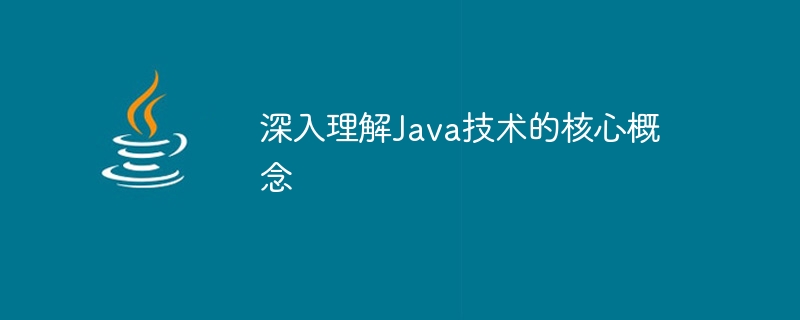

As a high-level programming language, Java has wide applications and far-reaching influence. In the process of learning and applying Java technology, it is very important to have a deep understanding of its core concepts. This article will conduct an in-depth discussion of the core concepts of Java technology from the aspects of Java's object-oriented features, encapsulation, inheritance, polymorphism, exception handling, threads and garbage collection.
Java is an object-oriented programming language with the characteristics of encapsulation, inheritance and polymorphism. Encapsulation refers to encapsulating data and data operations together to achieve code simplicity and reusability. Through encapsulation, we can hide the specific implementation details of the data and only expose the necessary interfaces for external calls. Inheritance refers to creating a new class by extending an existing class to inherit the properties and methods of the existing class. Through inheritance, we can achieve code reuse and modularization. Polymorphism means that objects of the same type can behave differently in different contexts. Through polymorphism, we can make our code more flexible and unified.
Exception handling is an integral part of Java programming. Exceptions are errors or unusual situations that may occur during program execution. Java provides a complete set of exception handling mechanisms that can help us catch, handle and throw exceptions. Handling exceptions reasonably and accurately can improve the robustness and reliability of the program.
Threads are another important concept in Java technology. Thread is the smallest unit of program execution. By creating and managing multiple threads, concurrent execution of multiple tasks can be achieved. Multi-threaded programming can improve the running efficiency and response speed of the program, but you also need to pay attention to thread safety issues. Java provides some synchronization mechanisms, such as the synchronized keyword and Lock interface, which can help us solve thread safety issues.
Garbage collection is an important feature of the Java language. The garbage collector can automatically manage memory and release objects that are no longer used. Java uses automatic memory management to recycle useless objects through the garbage collector, avoiding the cumbersome process of manually releasing memory. But you also need to pay attention to avoid memory leaks and over-reliance on garbage collection to ensure program performance and stability.
In-depth understanding of the core concepts of Java technology can help us write efficient, robust and maintainable code. Proficiency in Java's object-oriented features, encapsulation, inheritance and polymorphism can improve code reusability and scalability. Proper handling of exceptions, rational use of threads and garbage collection can improve program stability and performance. In short, an in-depth understanding of the core concepts of Java technology is an indispensable step to becoming an excellent Java programmer.
Through continuous learning and practice, we can continuously improve our understanding and application capabilities of the core concepts of Java technology. At the same time, actively participating in open source communities and technical discussions, communicating and sharing experiences with other developers are also effective ways to improve one's technical level.
The above is the detailed content of Deeply grasp the basic concepts of Java technology. For more information, please follow other related articles on the PHP Chinese website!
 The eight most commonly used functions in excel
The eight most commonly used functions in excel
 How to round in Matlab
How to round in Matlab
 What are the web servers?
What are the web servers?
 The difference between static web pages and dynamic web pages
The difference between static web pages and dynamic web pages
 What is the role of sip server
What is the role of sip server
 How to solve the problem that document.cookie cannot be obtained
How to solve the problem that document.cookie cannot be obtained
 How to open iso file
How to open iso file
 How to comment code in html
How to comment code in html




